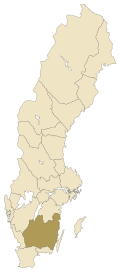Småland
| Småland | ||
|---|---|---|
|
||
 |
||
| Country | Sweden | |
| Land | Götaland | |
| Counties |
Kronoberg County Kalmar County Jönköping County Halland County Östergötland County |
|
| Area | ||
| • Total | 29,400 km2 (11,400 sq mi) | |
| Population (2009) | ||
| • Total | 720,358 | |
| • Density | 25/km2 (63/sq mi) | |
| Ethnicity | ||
| • Language | Swedish | |
| • Dialect | Småländska | |
| • Demonym | Smålänning | |
| Culture | ||
| • Flower | Twinflower | |
| • Animal | Otter | |
| • Bird | Song thrush | |
| Time zone | CET (UTC+1) | |
| • Summer (DST) | CEST (UTC+2) | |
| Postal codes | 33000–34999, 35000–36999, 38000–39999, 55000–57999, 59000–59999 (shared with Östergötland) | |
| Area codes | 0372 0433 0459 0470–0478 0480–0493 |
|
Småland (Swedish pronunciation: [ˈsmoːland]) is a historical province (landskap) in southern Sweden. Småland borders Blekinge, Scania (Swedish: Skåne), Halland, Västergötland, Östergötland and the island Öland in the Baltic Sea. The name Småland literally means Small Lands. The Latinized form Smolandia has been used in other languages. The highest point in Småland is Tomtabacken, at 377 metres (1,237 ft).
The traditional provinces of Sweden serve no administrative or political purposes, but are historical and cultural entities. The province is divided into the three administrative counties: Jönköping County, Kalmar County and Kronoberg County, which roughly cover the entire Småland province. Smaller areas of Småland, however, are situated in Halland County and Östergötland County.
The current coat of arms, granted in 1569, features a rampant red lion on a golden shield carrying a crossbow. The arms may appear with a ducal coronet. Blazon: "Or a lion rampant Gules langued and armed Azure holding in front paws a Crossbow of the second bowed and stringed Sable with a bolt Argent."
The population of Småland was 720,358 as of December 31, 2009, distributed over five counties as follows:
The geography is dominated by a forested high plain where the soil is mixed with sand and small boulders, making it in all except the coastal areas, and unsuited for agriculture except in certain locations, notably the Kalmar Plains. The province is rich in lakes and bogs. The coast consists of an archipelago of islands and bays in the north and cultivated flatlands in the south. In total, cultivated land covers 14%, meadows 7% and forest 50%.
...
Wikipedia

